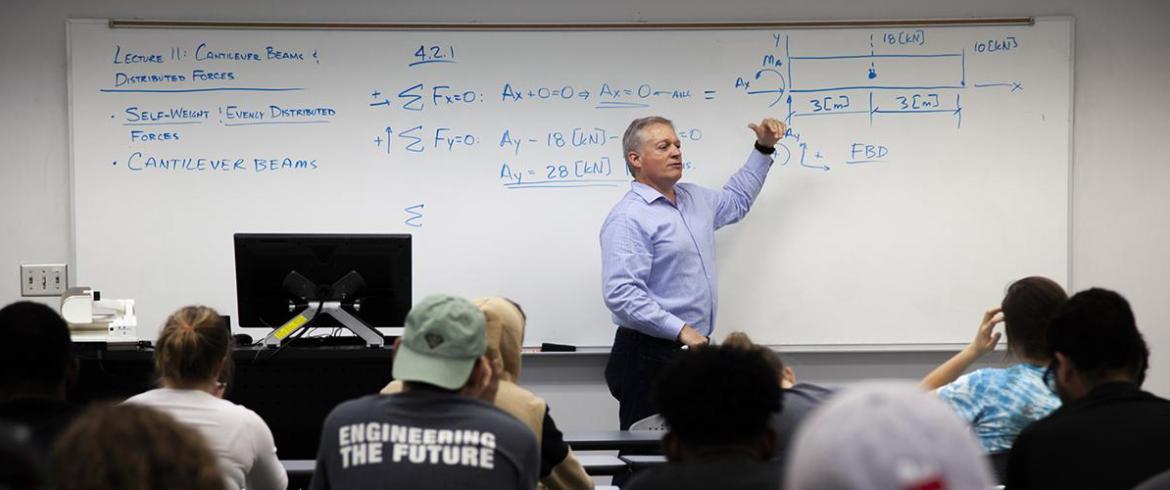
At Engineering Design Day in April, photographer Mark Wallheiser snapped an impromptu group photo of the 2018-19 Civil and Environmental Engineering senior design class. Later, the students placed a copy of that photo on a plaque they had made for their instructor, first-year Professor of Practice Sean Martin. The plaque read, “Thank you from your guinea pigs.”
It marked a successful end to Martin’s first year at the college, where he became the first engineering faculty member to carry the title of Professor of Practice. The American Association of University Professors describes the Professor of Practice rank as a new category of appointment, reserved for practitioners who are appointed to faculty positions because of skills and expertise acquired in non-academic careers.

As a licensed professional engineer with more than 25 years of private practice experience, Martin epitomizes that description. Both students and faculty see Martin as ideal for the position.
“When we envisioned hiring a Professor of Practice, we were looking for a person with a depth of experience in one aspect of civil engineering, and breadth of knowledge into the other major areas,” said Interim Chair Lisa Spainhour. “Sean fit the bill perfectly. He has an extensive background in the structural design of a variety of commercial, industrial and educational facilities, which has also exposed him to site development, drainage, traffic control and permitting problems. We knew Sean could help our students bridge the gap between the theoretical foundations of our early engineering courses and the practice-related skills that industry wants to see in new hires today.”
After initially pursuing a career in instrumental music and music therapy, Martin’s first connection with FAMU-FSU Engineering was as a student. He graduated from the college in 1993 with his Bachelor of Science in Civil Engineering, and again in 2000 with a Master of Science. Most of his professional career was with David H. Melvin Consulting Engineers in Tallahassee, which Martin joined in 1996. In the late 2000s, Martin was invited to give a classroom presentation, which eventually led to an adjunct teaching position. Martin loved the challenge of classroom instruction. Energized by the opportunity to convey his experience to the next generation of engineers, he returned to school to pursue his doctorate. Now a full-time professor and part-time student, Martin hopes to finish his Ph.D. within the next year.
Because of his many years working in the local engineering community, Martin has also established a network of engineering contacts that came in handy when securing design projects for the senior civil and environmental engineering students. Projects this year ranged from the extension of FAMU Way in Tallahassee to the restoration of Blue Springs in Marianna to the design of a new fire station in Panama City. Next year, several teams will work on FEMA-sponsored projects that focus on improving disaster resilience in rural communities hit hard by Hurricane Michael.
Senior Design students appreciated Martin’s broad knowledge about engineering practice. Badar Belhaj, a recent graduate of the CEE program, said that Martin’s experience as a practicing professional engineer makes him a unique asset to senior students ready to transition into the engineering field.
“Professor Martin gave us a real insight into the engineering world,” said Belhaj. “Through his teachings, I learned a lot about technical topics like steel structure integrity, but I was also introduced to real-world topics like organizing the design of an engineering project from start to finish, and leading a group of engineers.”
Martin is looking forward to the challenges that his second year as Professor of Practice will bring. As part of a curriculum revision that he helped to develop, the senior design sequence will add class time and credit hours, allowing him to provide more classroom instruction focused on engineering design and professional practice. He also is excited to help the department modernize its CAD curriculum.
“In today’s work environment, it’s not enough for young engineers to simply be technically proficient,” Martin said. “Today’s engineers must be effective communicators, team members, leaders and entrepreneurs. Tomorrow’s engineering solutions must be sustainable and must be developed within the context of global, economic, environmental and societal constraints. Few things bring me more joy than the opportunity to share my experiences with the students.”
